Unit 1 Where did you go on vacation? Section A (3a-3c) 课件
文档属性
| 名称 | Unit 1 Where did you go on vacation? Section A (3a-3c) 课件 | 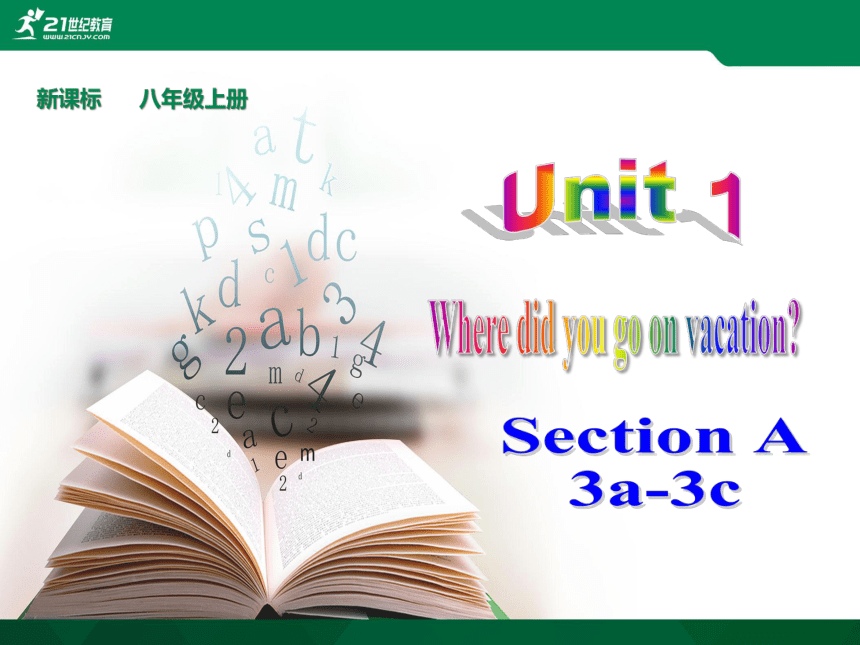 | |
| 格式 | zip | ||
| 文件大小 | 4.3MB | ||
| 资源类型 | 试卷 | ||
| 版本资源 | 人教新目标(Go for it)版 | ||
| 科目 | 英语 | ||
| 更新时间 | 2019-07-01 12:14:16 | ||
图片预览

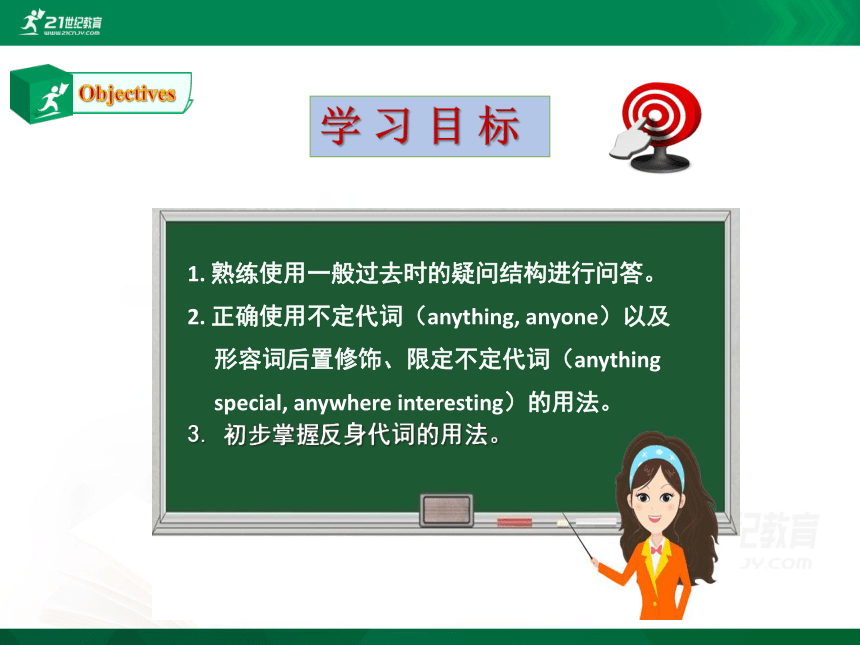

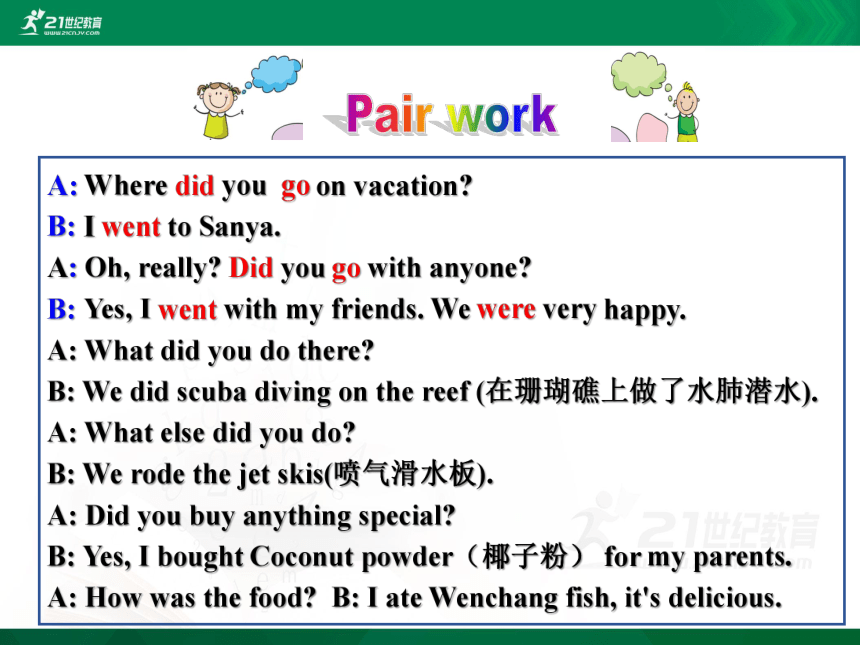
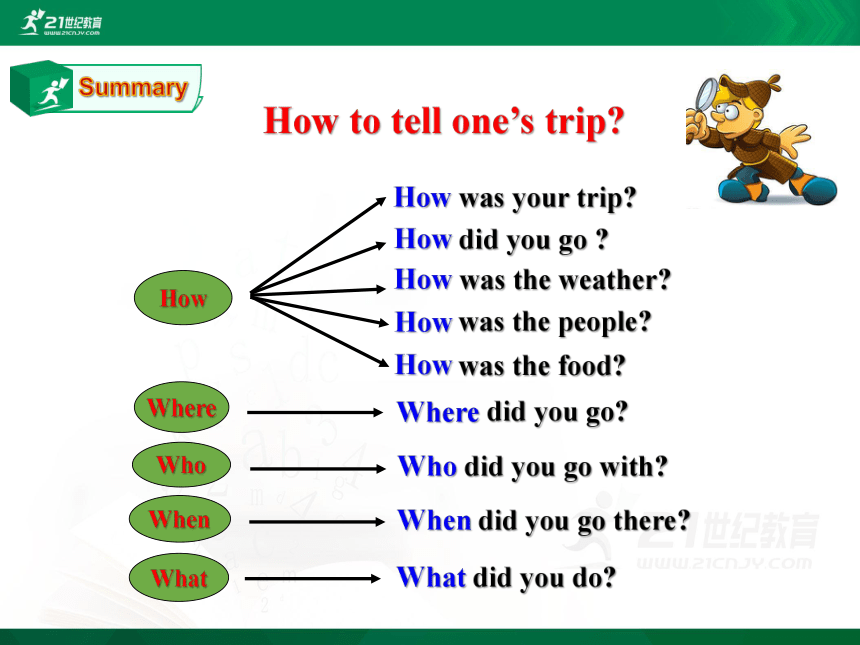
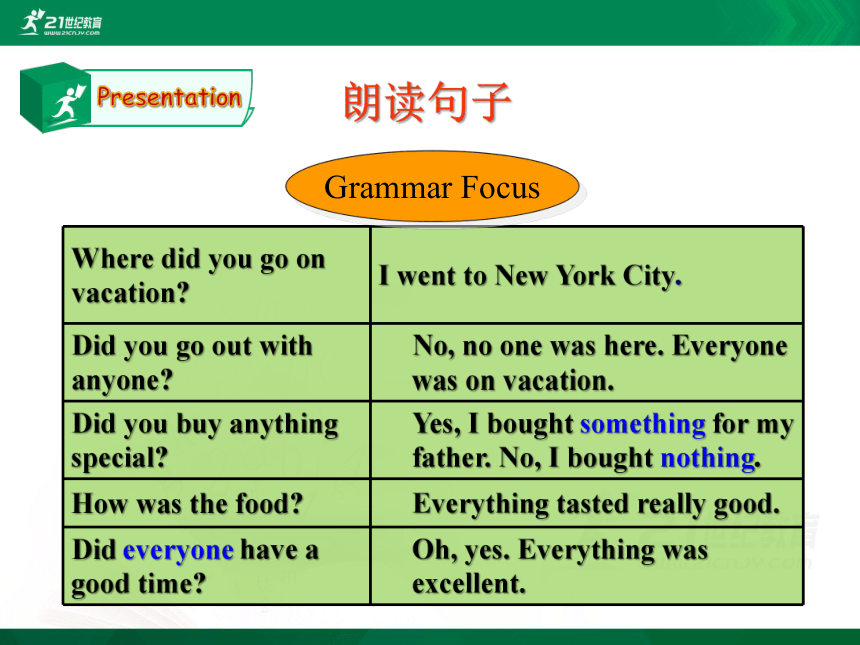
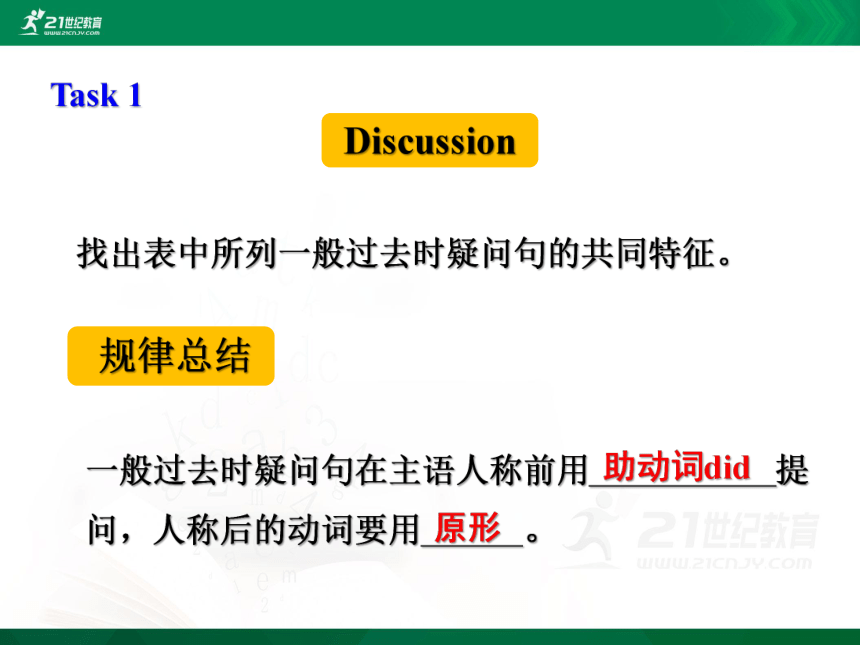
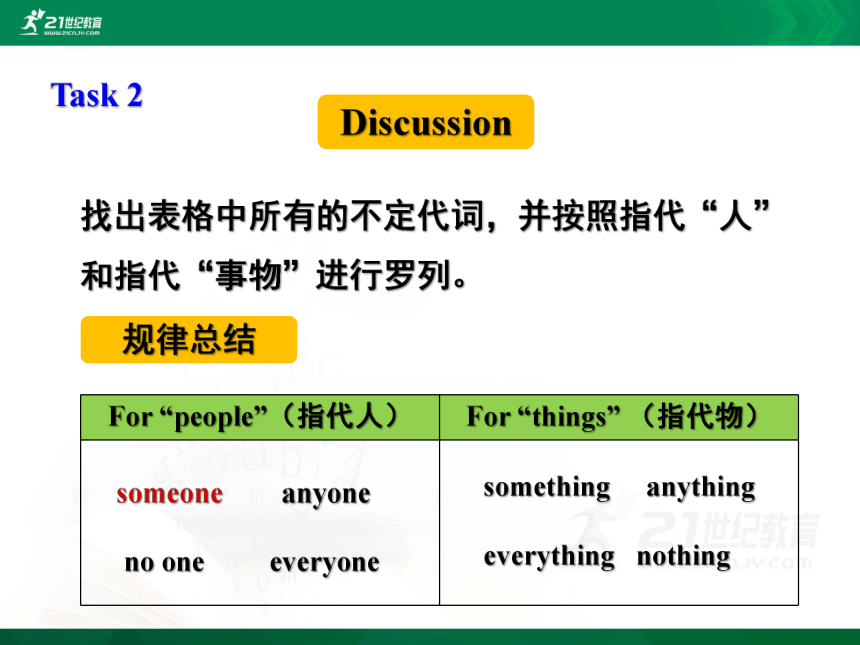
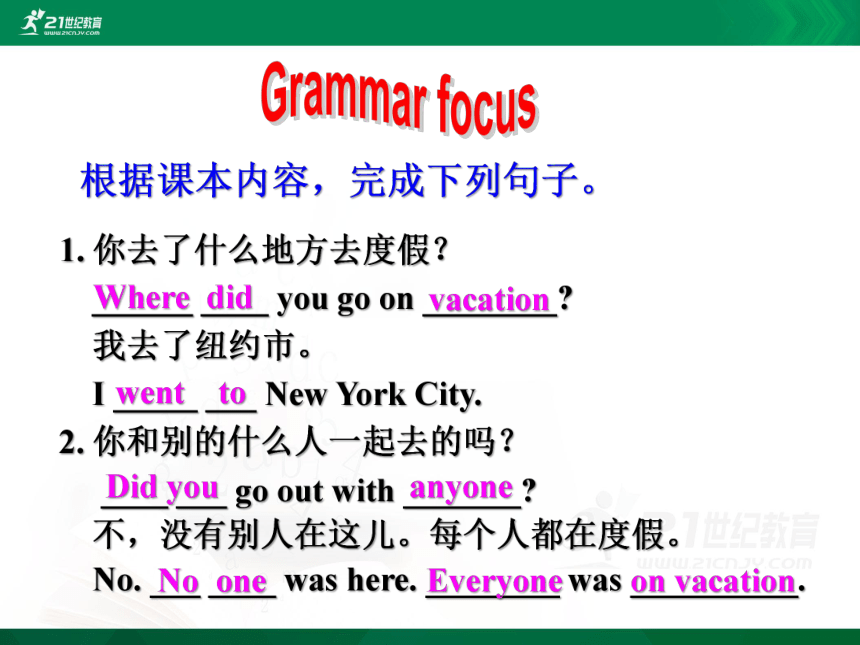
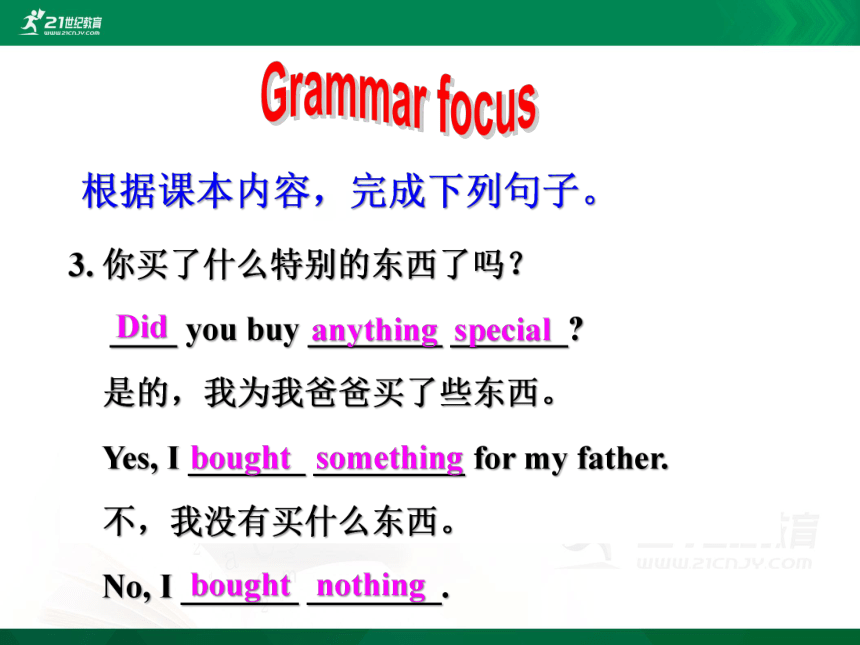
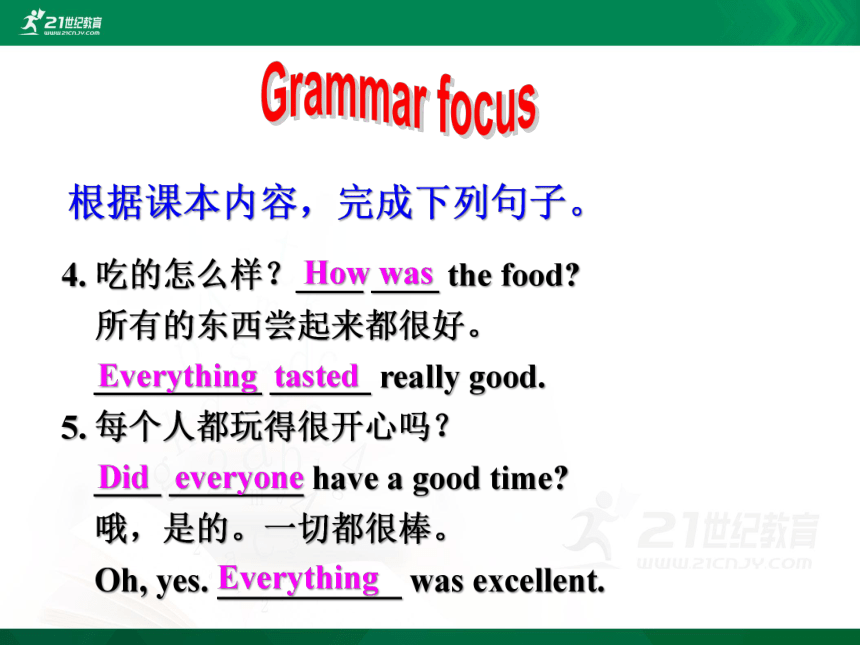
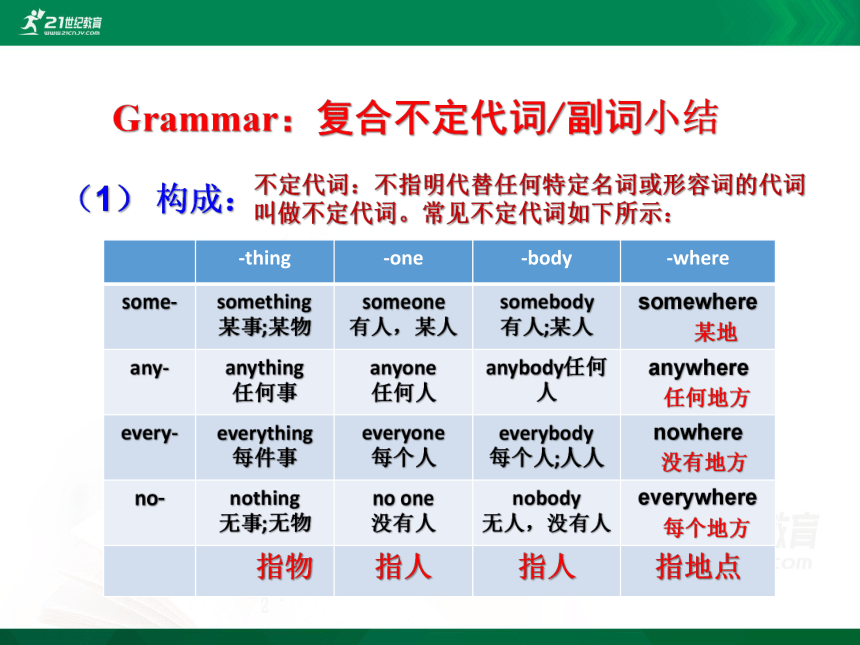
文档简介
(共43张PPT)
新课标 八年级上册
学 习 目 标
1. 熟练使用一般过去时的疑问结构进行问答。
2. 正确使用不定代词(anything, anyone)以及
形容词后置修饰、限定不定代词(anything
special, anywhere interesting)的用法。
3. 初步掌握反身代词的用法。
谈论假期活动
Where did you go on vacation?
Did you go with anyone?
Did you meet anyone interesting?
Did you eat anything delicious?
A: Where did you go on vacation?
B: I went to Sanya.
A: Oh, really? Did you go with anyone?
B: Yes, I went with my friends. We were very happy.
A: What did you do there?
B: We did scuba diving on the reef (在珊瑚礁上做了水肺潜水).
A: What else did you do?
B: We rode the jet skis(喷气滑水板).
A: Did you buy anything special?
B: Yes, I bought Coconut powder(椰子粉) for my parents.
A: How was the food? B: I ate Wenchang fish, it's delicious.
How to tell one’s trip?
How was your trip?
Where did you go?
What did you do?
How was the weather?
Who did you go with?
How
Where
What
Who
When did you go there?
When
How did you go ?
How was the people?
How was the food?
Grammar Focus
朗读句子
Where did you go on vacation? I went to New York City.
Did you go out with anyone? No, no one was here. Everyone was on vacation.
Did you buy anything special? Yes, I bought something for my father. No, I bought nothing.
How was the food? Everything tasted really good.
Did everyone have a good time? Oh, yes. Everything was excellent.
Discussion
找出表中所列一般过去时疑问句的共同特征。
规律总结
一般过去时疑问句在主语人称前用___________提问,人称后的动词要用______。
助动词did
原形
Task 1
Task 2
找出表格中所有的不定代词,并按照指代“人”和指代“事物”进行罗列。
规律总结
anyone
no one everyone
someone
something anything
everything nothing
Discussion
For “people”(指代人) For “things” (指代物)
1. 你去了什么地方去度假?
______ ____ you go on ________?
我去了纽约市。
I _____ ___ New York City.
2. 你和别的什么人一起去的吗?
____ ___ go out with _______?
不,没有别人在这儿。每个人都在度假。
No. ___ ____ was here. ________ was __________.
vacation
Where did
went to
Did you
anyone
根据课本内容,完成下列句子。
No one
Everyone
on vacation
3. 你买了什么特别的东西了吗?
____ you buy ________ _______?
是的,我为我爸爸买了些东西。
Yes, I _______ _________ for my father.
不,我没有买什么东西。
No, I _______ ________.
anything special
Did
bought something
bought nothing
根据课本内容,完成下列句子。
4. 吃的怎么样?____ ____ the food?
所有的东西尝起来都很好。
__________ ______ really good.
5. 每个人都玩得很开心吗?
____ ________ have a good time?
哦,是的。一切都很棒。
Oh, yes. ___________ was excellent.
How was
Everything tasted
Did everyone
Everything
根据课本内容,完成下列句子。
Grammar:复合不定代词/副词小结
(1) 构成:
不定代词:不指明代替任何特定名词或形容词的代词叫做不定代词。常见不定代词如下所示:
-thing -one -body -where
some- something
某事;某物 someone
有人,某人 somebody
有人;某人 somewhere
某地
any- anything
任何事 anyone
任何人 anybody任何人 anywhere
任何地方
every- everything 每件事 everyone
每个人 everybody
每个人;人人 nowhere
没有地方
no- nothing
无事;无物 no one
没有人 nobody
无人,没有人 everywhere
每个地方
指物 指人 指人 指地点
根据句意, 选用适当的复合不定代词或不定副词填空。
1. —Is _________ here today? ???? —Yes, we’re all here. _______ is away.
2. —Is there _________ in the red box? ??? —No, there is ________ in it.
3. There is __________ wrong with my bike.
It doesn’t work.
4. Jim! _________ is waiting for you at the school gate.
everybody
Nobody
something
nothing
Somebody
anything
跟 踪 练 习
5. In spring , ___________ begins to grow.
6. There is __________ knocking at the
door. Please go and see who it is.
7. The math exam is very difficult. I think ________
can pass it.
8. I can’t find my pen. I think _________has stolen it.
9. ________is in the room, are they?
everything
somebody
nobody
somebody
Nobody
跟 踪 练 习
10. Does ________ watch the film? It’s so interesting.
11. There’s _______ new and important in today’s
newspaper. You needn’t buy one.
12. —Who is in the classroom? ???? —It’s empty. ________ is in it.
13. Maybe _________ put my bag ____________. I
look for it __________, but I can’t find it ________.
nothing
somebody
Nobody
somewhere
everywhere
anywhere
anybody
跟 踪 练 习
1. 含-body和-one的复合代词只用来指人,含-body的复合不
定代词与含-one的复合不定代词在功能和意义上完全相同,
可以互换。只是用-body时显得较通俗些,多用于口语中,
用-one时显得较文雅些,更常见于正式场合及书面语中。
Someone/Somebody is crying in the next room.
有人在隔壁房间哭。
No one/Nobody is stupid. 没有谁是愚蠢的。
2. 含-thing的复合不定代词只用来指事物。如:
Are you going to buy anything?
你会去买东西吗?
I can hear nothing but your voice.
我只听到了你的声音。
(2)用法说明:
Grammar:复合不定代词/副词小结
3. 由 some- 构成的复合不定代词一般用于肯定句中;但在表
示请求、邀请、提建议等带有委婉语气的疑问句,和希望得
到对方肯定答复的疑问句,以及表示反问的问句中,也
something,someone,somebody等复合不定代词。如:
Would you like something to eat?
要些吃的东西吗?
Isn't there something wrong with you?
难道你没问题吗?
Grammar:复合不定代词/副词小结
(2)用法说明:
4. 由 any- 构成的不定代词常用于否定句,疑问句或
条件状语从句中。但当 anything表示"任何事(物),
无论何事(物)",anyone,anybody表示"无论谁,
任何人"等意义时,它们也可以用于肯定句中。如:
Anything is OK.
什么都行。
Anybody knows the answer.
任何人都知道答案。
Grammar:复合不定代词/副词小结
(2)用法说明:
5. 不定代词作主语,谓语动词用第三人称单数形式。
Everything begins to grow in spring.
6. 形容词修饰复合不定代词时要后置。
I have something important to tell you.
Is there anything special in the box?
Nobody else can answer the question.
Grammar:复合不定代词/副词小结
(2)用法说明:
1. Everything_____free. Good luck to you.
A. am B. is C. are D. be
2. I can't find my book ____. Can you help me?
A. anything B. anywhere C. somewhere
3. - Can I help you, boy?
- Yes. There is ____ wrong with my bike.
A. something B. anything C. nothing
4. Is there _____new in today's newspaper?
A. something new B. anything new C. new anything.
5. I have ____to do but wait.
A. something B. anything C. nothing
跟 踪 练 习
B
B
A
B
C
6. - Do you have _____ to say for yourself?
- No, I have _____ to say.
A. something; everything B. nothing; something
C. everything; anything D. anything; nothing
7. – Would you like _____ to eat? -Thanks, please.
A. Something B. anything
C. some things D. any things
D
A
跟 踪 练 习
Fill in the blanks with the words in the box and practice the conversation.
Linda: Did you do ________ fun on your vacation, Alice?
Alice: Yes, I did. I went to Sanya.
Linda: How did you like it?
Alice: Well, it was my first time there, so
_________ was really interesting.
Linda: Did you go with ________?
Alice: Yes, I did. I went with my sister.
Linda: Did you go shopping?
Alice: Of course! I bought _________ for my parents, but
_______ for myself.
Linda: Why didn’t you buy ________ for yourself?
Alice: I didn’t really see ________ I liked.
anyone
something
anything
everything
nothing
anything
everything
anyone
something
nothing
anything
anything
Complete 3a without looking at the text.
Alice _______Sanya last vacation. It ____ her_____ time there.So __________was really interesting. She went with_____.She went ____and bought _____for her____but____for herself, because she didn’t really see_____she liked.
went to
was
first
everything
her sister
shopping
something
parents
nothing
anything
1. 反身代词(myself ,yourself )表示动作返回到执行者
本身,即主语和宾语是同一个或一些人或物。
1. 自身代词的构成:
myself yourself himself herself itself
我自己 你自己 他自己 她自己 它自己
ourselves yourselves themselves
我们自己 你们自己 他们自己
⑴ 作及物动词和介词的宾语。
1. Did you buy anything for yourself?
你为你自己买什么东西了吗?(做介词宾语)
2. The old man taught himself English.
那位老人自学英语。(做动词宾语)
⑵ 作主语和宾语的同位语。
3. The thing itself is not important.
事情本身并不重要。 (做主语的同位语)
4. I myself visited my aunt last weekend.
上周我自己去拜访了姑姑。 (做主语的同位语)
5. I saw the actor himself yesterday .(做主语的同位语)
2. 自身代词的用法:
Fill in the blanks in the e-mail message with the words in the box.
anything everything nothing everyone no one
Dear Bill,
How was your vacation? Did you do ________ interesting? Did ________ in the family go with you? I went to a friend’s farm in the countryside with my family. ___________ was great. We fed some hens and saw some baby pigs. They were so cute! The only problem was that there was _______ much to do in the evening but read. Still _______ seemed to be bored. Bye for now!
Mark
anything
everyone
Everything
nothing
no one
Read the e-mail again and answer questions.
1. Where did Mark go on his vacation?
He went to a friend’s farm in the countryside.
2. How was his vacation?
Everything was great.
3. What did Mark do on the farm?
He fed some hens and saw some baby pigs.
4. What was the problem?
There was nothing much to do but read in the
evening.
1. The only problem was that there was nothing much to do in
the evening but read.
唯一的问题是晚上除了看书就没其他的事可做了。
(1)That…在此引导一个表语从句,
The problem is that Li Xuepeng has no money.
问题是你昨天没完成作业。
The problem was that you didn’t finish your homework.
问题是王尧每天无所事事。
The problem is that Wang Yao has nothing much to do
every day.
(2) nothing much to do “没有太多的事可做”
much 和 to do 都用来修饰复合不定代词nothing ,注意其位置,先形容词,后动词不定式。再如:
I have something important to tell you.
(3) nothing to do but + v(原形) “除……之外没有事情可做”
but在此当“除了”讲,注意"前有do后无to,前无to后有do"。
【比较】
You have no choice but to wait.
I have nothing to do but wait.
2. Still no one seemed to be bored.
(1) seem意为“好像;似乎;看来”,可用作系动
词或不及物动词,其主要用法如下:
① seem+ (to be) +n. /adj. “看起来像……”,如:
The movie seems (to be) interesting.
Tom seems (to be) a very clever boy.
② seem to do sth. 如:
She seems to know our secret.
She doesn't seem to like the idea.
③ It seems that ... 如:
It seems that Mr. Zhang is at home.
据汉语意思完成英语句子。
1) 这儿的衣服似乎很贵。
The clothes here __________very expensive.
2) 他们似乎周六要去上海。
They seem _____ to Shanghai on Saturday.
3) 好像今天她要开车去上班。
____________ she’ll drive to work today.
seem to be
to go?
It seems that
跟踪练习
(2) boring与bored的用法区别
bored和boring是动词bore的两个形容词。
bored表示 “感到厌烦的”,用来指人;
boring表示“令人厌烦的 ”,用来指物。
翻译下列句子
1)这部电视剧很无聊。
2) 我很无聊。
The TV play is boring.
I am very bored.
Ask your group questions about their last vacation. Then tell the class your results.
Did you … Everyone Someone (write classmate’s name) No one
eat anything at a restaurant?
read anything interesting?
visit anyone in your family?
buy anything?
keep a diary?
In our group, everyone ate something at a restaurant. No one read anything interesting. Li Lei visited his grandparents in the town. Liu Xue bought something interesting. Xu Li kept a diary.
Now work by yourselves. Then give your own report on your group.
1. I can’t hear anything = I can hear ________.
2. There is _________ on the floor. Please pick it up.
3. Did _______ go to play basketball with you ?
4. I phoned you last night, but _______ answered it.
5. I don’t think ________ telephoned.
6. Don’t worry. There’s _______wrong with your ears.
7. There’s _______ in the box. It’s empty.
8. Maybe ________put my pencil ___________.
I can’t find it _________.
一、用不定代词或不定副词填空
nothing
something
anyone
nobody
anybody
nothing
nothing
someone
somewhere
anywhere
Exercises
9. ________ found Mr. Li’s keys and gave them back
to him yesterday.
10. ─ Did you see ________ in the big box?
─ No, I didn’t. There’s _______ in it.
11. ______ helped the little boy. He did it himself.
12. My watch doesn’t work. __________is wrong with it.
13. ─ Hello, _________! ─ Hello, Mr. Smith!
14. ─ How’s it going, Jack?
─ Great! ___________is going well.
15. ─ Did you go to the beach with _______?
─ Yes. I went there with my cousin.
anyone
Everything
everyone
Something
anything
nothing
No one
Someone
Exercises
二、请用正确动词形式填空。 1. I ____ (have) an exciting party last weekend.
2. They all _____(go) to the mountains yesterday. 3. She _________ (not visit) her aunt last weekend.
4. I _____ (write) this song last year.
5. We?_______ ?(watch) a football game yesterday.
6. Last weekend she ______ (stay) at home and
___ (do) some cleaning.
7. Last year there?_____ (be) more plants here than
this year.
had
went
didn’t visit
wrote
watched
stayed
did
were
Exercises
三、句型转换
1. She went to the beach last Sunday.(一般疑问句)
___________________________________
2. The weather was hot and humid. (否定句)
___________________________________
3. They stayed at home on vacation. (画线提问)
______________________________________
4. The people in New York were friendly. (画线提问)
____________________________________
Did she go to the beach last Sunday?
The weather wasn't hot or humid.
Where did they stay on vacation?
How were the people in New York?
Exercises
四、选择填空。 1. I have ____ to tell you.
A. anything interesting B. something interesting
C. interesting anything D. interesting something
2. The light in the room still on, I think ____ is in the
room.
A. everyone B. anyone C. someone
3. The work is very easy, I can do it by ____.
A. me B. my C. mine D. myself
B
C
D
Exercises
4. The TV show is very ____, and I feel ____.
A. boring, bored B. boring, boring
C. bored, bored D. bored, boring
5. He seems ____ after hard work.
A. to tired B. tired C. to be tired
6. - Can you help me with my English? -____.
A. Of course B. You are welcome
C. That's for sure.
A
C
A
Exercises
Homework
Remember the words and phrases in this class.
询问身边的人假期都怎么过得,并记录下来。
谢谢
21世纪教育网(www.21cnjy.com) 中小学教育资源网站
有大把高质量资料?一线教师?一线教研员?
欢迎加入21世纪教育网教师合作团队!!月薪过万不是梦!!
详情请看:
https://www.21cnjy.com/help/help_extract.php
新课标 八年级上册
学 习 目 标
1. 熟练使用一般过去时的疑问结构进行问答。
2. 正确使用不定代词(anything, anyone)以及
形容词后置修饰、限定不定代词(anything
special, anywhere interesting)的用法。
3. 初步掌握反身代词的用法。
谈论假期活动
Where did you go on vacation?
Did you go with anyone?
Did you meet anyone interesting?
Did you eat anything delicious?
A: Where did you go on vacation?
B: I went to Sanya.
A: Oh, really? Did you go with anyone?
B: Yes, I went with my friends. We were very happy.
A: What did you do there?
B: We did scuba diving on the reef (在珊瑚礁上做了水肺潜水).
A: What else did you do?
B: We rode the jet skis(喷气滑水板).
A: Did you buy anything special?
B: Yes, I bought Coconut powder(椰子粉) for my parents.
A: How was the food? B: I ate Wenchang fish, it's delicious.
How to tell one’s trip?
How was your trip?
Where did you go?
What did you do?
How was the weather?
Who did you go with?
How
Where
What
Who
When did you go there?
When
How did you go ?
How was the people?
How was the food?
Grammar Focus
朗读句子
Where did you go on vacation? I went to New York City.
Did you go out with anyone? No, no one was here. Everyone was on vacation.
Did you buy anything special? Yes, I bought something for my father. No, I bought nothing.
How was the food? Everything tasted really good.
Did everyone have a good time? Oh, yes. Everything was excellent.
Discussion
找出表中所列一般过去时疑问句的共同特征。
规律总结
一般过去时疑问句在主语人称前用___________提问,人称后的动词要用______。
助动词did
原形
Task 1
Task 2
找出表格中所有的不定代词,并按照指代“人”和指代“事物”进行罗列。
规律总结
anyone
no one everyone
someone
something anything
everything nothing
Discussion
For “people”(指代人) For “things” (指代物)
1. 你去了什么地方去度假?
______ ____ you go on ________?
我去了纽约市。
I _____ ___ New York City.
2. 你和别的什么人一起去的吗?
____ ___ go out with _______?
不,没有别人在这儿。每个人都在度假。
No. ___ ____ was here. ________ was __________.
vacation
Where did
went to
Did you
anyone
根据课本内容,完成下列句子。
No one
Everyone
on vacation
3. 你买了什么特别的东西了吗?
____ you buy ________ _______?
是的,我为我爸爸买了些东西。
Yes, I _______ _________ for my father.
不,我没有买什么东西。
No, I _______ ________.
anything special
Did
bought something
bought nothing
根据课本内容,完成下列句子。
4. 吃的怎么样?____ ____ the food?
所有的东西尝起来都很好。
__________ ______ really good.
5. 每个人都玩得很开心吗?
____ ________ have a good time?
哦,是的。一切都很棒。
Oh, yes. ___________ was excellent.
How was
Everything tasted
Did everyone
Everything
根据课本内容,完成下列句子。
Grammar:复合不定代词/副词小结
(1) 构成:
不定代词:不指明代替任何特定名词或形容词的代词叫做不定代词。常见不定代词如下所示:
-thing -one -body -where
some- something
某事;某物 someone
有人,某人 somebody
有人;某人 somewhere
某地
any- anything
任何事 anyone
任何人 anybody任何人 anywhere
任何地方
every- everything 每件事 everyone
每个人 everybody
每个人;人人 nowhere
没有地方
no- nothing
无事;无物 no one
没有人 nobody
无人,没有人 everywhere
每个地方
指物 指人 指人 指地点
根据句意, 选用适当的复合不定代词或不定副词填空。
1. —Is _________ here today? ???? —Yes, we’re all here. _______ is away.
2. —Is there _________ in the red box? ??? —No, there is ________ in it.
3. There is __________ wrong with my bike.
It doesn’t work.
4. Jim! _________ is waiting for you at the school gate.
everybody
Nobody
something
nothing
Somebody
anything
跟 踪 练 习
5. In spring , ___________ begins to grow.
6. There is __________ knocking at the
door. Please go and see who it is.
7. The math exam is very difficult. I think ________
can pass it.
8. I can’t find my pen. I think _________has stolen it.
9. ________is in the room, are they?
everything
somebody
nobody
somebody
Nobody
跟 踪 练 习
10. Does ________ watch the film? It’s so interesting.
11. There’s _______ new and important in today’s
newspaper. You needn’t buy one.
12. —Who is in the classroom? ???? —It’s empty. ________ is in it.
13. Maybe _________ put my bag ____________. I
look for it __________, but I can’t find it ________.
nothing
somebody
Nobody
somewhere
everywhere
anywhere
anybody
跟 踪 练 习
1. 含-body和-one的复合代词只用来指人,含-body的复合不
定代词与含-one的复合不定代词在功能和意义上完全相同,
可以互换。只是用-body时显得较通俗些,多用于口语中,
用-one时显得较文雅些,更常见于正式场合及书面语中。
Someone/Somebody is crying in the next room.
有人在隔壁房间哭。
No one/Nobody is stupid. 没有谁是愚蠢的。
2. 含-thing的复合不定代词只用来指事物。如:
Are you going to buy anything?
你会去买东西吗?
I can hear nothing but your voice.
我只听到了你的声音。
(2)用法说明:
Grammar:复合不定代词/副词小结
3. 由 some- 构成的复合不定代词一般用于肯定句中;但在表
示请求、邀请、提建议等带有委婉语气的疑问句,和希望得
到对方肯定答复的疑问句,以及表示反问的问句中,也
something,someone,somebody等复合不定代词。如:
Would you like something to eat?
要些吃的东西吗?
Isn't there something wrong with you?
难道你没问题吗?
Grammar:复合不定代词/副词小结
(2)用法说明:
4. 由 any- 构成的不定代词常用于否定句,疑问句或
条件状语从句中。但当 anything表示"任何事(物),
无论何事(物)",anyone,anybody表示"无论谁,
任何人"等意义时,它们也可以用于肯定句中。如:
Anything is OK.
什么都行。
Anybody knows the answer.
任何人都知道答案。
Grammar:复合不定代词/副词小结
(2)用法说明:
5. 不定代词作主语,谓语动词用第三人称单数形式。
Everything begins to grow in spring.
6. 形容词修饰复合不定代词时要后置。
I have something important to tell you.
Is there anything special in the box?
Nobody else can answer the question.
Grammar:复合不定代词/副词小结
(2)用法说明:
1. Everything_____free. Good luck to you.
A. am B. is C. are D. be
2. I can't find my book ____. Can you help me?
A. anything B. anywhere C. somewhere
3. - Can I help you, boy?
- Yes. There is ____ wrong with my bike.
A. something B. anything C. nothing
4. Is there _____new in today's newspaper?
A. something new B. anything new C. new anything.
5. I have ____to do but wait.
A. something B. anything C. nothing
跟 踪 练 习
B
B
A
B
C
6. - Do you have _____ to say for yourself?
- No, I have _____ to say.
A. something; everything B. nothing; something
C. everything; anything D. anything; nothing
7. – Would you like _____ to eat? -Thanks, please.
A. Something B. anything
C. some things D. any things
D
A
跟 踪 练 习
Fill in the blanks with the words in the box and practice the conversation.
Linda: Did you do ________ fun on your vacation, Alice?
Alice: Yes, I did. I went to Sanya.
Linda: How did you like it?
Alice: Well, it was my first time there, so
_________ was really interesting.
Linda: Did you go with ________?
Alice: Yes, I did. I went with my sister.
Linda: Did you go shopping?
Alice: Of course! I bought _________ for my parents, but
_______ for myself.
Linda: Why didn’t you buy ________ for yourself?
Alice: I didn’t really see ________ I liked.
anyone
something
anything
everything
nothing
anything
everything
anyone
something
nothing
anything
anything
Complete 3a without looking at the text.
Alice _______Sanya last vacation. It ____ her_____ time there.So __________was really interesting. She went with_____.She went ____and bought _____for her____but____for herself, because she didn’t really see_____she liked.
went to
was
first
everything
her sister
shopping
something
parents
nothing
anything
1. 反身代词(myself ,yourself )表示动作返回到执行者
本身,即主语和宾语是同一个或一些人或物。
1. 自身代词的构成:
myself yourself himself herself itself
我自己 你自己 他自己 她自己 它自己
ourselves yourselves themselves
我们自己 你们自己 他们自己
⑴ 作及物动词和介词的宾语。
1. Did you buy anything for yourself?
你为你自己买什么东西了吗?(做介词宾语)
2. The old man taught himself English.
那位老人自学英语。(做动词宾语)
⑵ 作主语和宾语的同位语。
3. The thing itself is not important.
事情本身并不重要。 (做主语的同位语)
4. I myself visited my aunt last weekend.
上周我自己去拜访了姑姑。 (做主语的同位语)
5. I saw the actor himself yesterday .(做主语的同位语)
2. 自身代词的用法:
Fill in the blanks in the e-mail message with the words in the box.
anything everything nothing everyone no one
Dear Bill,
How was your vacation? Did you do ________ interesting? Did ________ in the family go with you? I went to a friend’s farm in the countryside with my family. ___________ was great. We fed some hens and saw some baby pigs. They were so cute! The only problem was that there was _______ much to do in the evening but read. Still _______ seemed to be bored. Bye for now!
Mark
anything
everyone
Everything
nothing
no one
Read the e-mail again and answer questions.
1. Where did Mark go on his vacation?
He went to a friend’s farm in the countryside.
2. How was his vacation?
Everything was great.
3. What did Mark do on the farm?
He fed some hens and saw some baby pigs.
4. What was the problem?
There was nothing much to do but read in the
evening.
1. The only problem was that there was nothing much to do in
the evening but read.
唯一的问题是晚上除了看书就没其他的事可做了。
(1)That…在此引导一个表语从句,
The problem is that Li Xuepeng has no money.
问题是你昨天没完成作业。
The problem was that you didn’t finish your homework.
问题是王尧每天无所事事。
The problem is that Wang Yao has nothing much to do
every day.
(2) nothing much to do “没有太多的事可做”
much 和 to do 都用来修饰复合不定代词nothing ,注意其位置,先形容词,后动词不定式。再如:
I have something important to tell you.
(3) nothing to do but + v(原形) “除……之外没有事情可做”
but在此当“除了”讲,注意"前有do后无to,前无to后有do"。
【比较】
You have no choice but to wait.
I have nothing to do but wait.
2. Still no one seemed to be bored.
(1) seem意为“好像;似乎;看来”,可用作系动
词或不及物动词,其主要用法如下:
① seem+ (to be) +n. /adj. “看起来像……”,如:
The movie seems (to be) interesting.
Tom seems (to be) a very clever boy.
② seem to do sth. 如:
She seems to know our secret.
She doesn't seem to like the idea.
③ It seems that ... 如:
It seems that Mr. Zhang is at home.
据汉语意思完成英语句子。
1) 这儿的衣服似乎很贵。
The clothes here __________very expensive.
2) 他们似乎周六要去上海。
They seem _____ to Shanghai on Saturday.
3) 好像今天她要开车去上班。
____________ she’ll drive to work today.
seem to be
to go?
It seems that
跟踪练习
(2) boring与bored的用法区别
bored和boring是动词bore的两个形容词。
bored表示 “感到厌烦的”,用来指人;
boring表示“令人厌烦的 ”,用来指物。
翻译下列句子
1)这部电视剧很无聊。
2) 我很无聊。
The TV play is boring.
I am very bored.
Ask your group questions about their last vacation. Then tell the class your results.
Did you … Everyone Someone (write classmate’s name) No one
eat anything at a restaurant?
read anything interesting?
visit anyone in your family?
buy anything?
keep a diary?
In our group, everyone ate something at a restaurant. No one read anything interesting. Li Lei visited his grandparents in the town. Liu Xue bought something interesting. Xu Li kept a diary.
Now work by yourselves. Then give your own report on your group.
1. I can’t hear anything = I can hear ________.
2. There is _________ on the floor. Please pick it up.
3. Did _______ go to play basketball with you ?
4. I phoned you last night, but _______ answered it.
5. I don’t think ________ telephoned.
6. Don’t worry. There’s _______wrong with your ears.
7. There’s _______ in the box. It’s empty.
8. Maybe ________put my pencil ___________.
I can’t find it _________.
一、用不定代词或不定副词填空
nothing
something
anyone
nobody
anybody
nothing
nothing
someone
somewhere
anywhere
Exercises
9. ________ found Mr. Li’s keys and gave them back
to him yesterday.
10. ─ Did you see ________ in the big box?
─ No, I didn’t. There’s _______ in it.
11. ______ helped the little boy. He did it himself.
12. My watch doesn’t work. __________is wrong with it.
13. ─ Hello, _________! ─ Hello, Mr. Smith!
14. ─ How’s it going, Jack?
─ Great! ___________is going well.
15. ─ Did you go to the beach with _______?
─ Yes. I went there with my cousin.
anyone
Everything
everyone
Something
anything
nothing
No one
Someone
Exercises
二、请用正确动词形式填空。 1. I ____ (have) an exciting party last weekend.
2. They all _____(go) to the mountains yesterday. 3. She _________ (not visit) her aunt last weekend.
4. I _____ (write) this song last year.
5. We?_______ ?(watch) a football game yesterday.
6. Last weekend she ______ (stay) at home and
___ (do) some cleaning.
7. Last year there?_____ (be) more plants here than
this year.
had
went
didn’t visit
wrote
watched
stayed
did
were
Exercises
三、句型转换
1. She went to the beach last Sunday.(一般疑问句)
___________________________________
2. The weather was hot and humid. (否定句)
___________________________________
3. They stayed at home on vacation. (画线提问)
______________________________________
4. The people in New York were friendly. (画线提问)
____________________________________
Did she go to the beach last Sunday?
The weather wasn't hot or humid.
Where did they stay on vacation?
How were the people in New York?
Exercises
四、选择填空。 1. I have ____ to tell you.
A. anything interesting B. something interesting
C. interesting anything D. interesting something
2. The light in the room still on, I think ____ is in the
room.
A. everyone B. anyone C. someone
3. The work is very easy, I can do it by ____.
A. me B. my C. mine D. myself
B
C
D
Exercises
4. The TV show is very ____, and I feel ____.
A. boring, bored B. boring, boring
C. bored, bored D. bored, boring
5. He seems ____ after hard work.
A. to tired B. tired C. to be tired
6. - Can you help me with my English? -____.
A. Of course B. You are welcome
C. That's for sure.
A
C
A
Exercises
Homework
Remember the words and phrases in this class.
询问身边的人假期都怎么过得,并记录下来。
谢谢
21世纪教育网(www.21cnjy.com) 中小学教育资源网站
有大把高质量资料?一线教师?一线教研员?
欢迎加入21世纪教育网教师合作团队!!月薪过万不是梦!!
详情请看:
https://www.21cnjy.com/help/help_extract.php
同课章节目录
- Unit 1 Where did you go on vacation?
- Section A
- Section B
- Unit 2 How often do you exercise?
- Section A
- Section B
- Unit 3 I'm more outgoing than my sister.
- Section A
- Section B
- Unit 4 What's the best movie theater?
- Section A
- Section B
- Unit 5 Do you want to watch a game show?
- Section A
- Section B
- Unit 6 I'm going to study computer science.
- Section A
- Section B
- Unit 7 Will people have robots?
- Section A
- Section B
- Unit 8 How do you make a banana milk shake?
- Section A
- Section B
- Unit 9 Can you come to my party?
- Section A
- Section B
- Unit 10 If you go to the party, you'll have a grea
- Section A
- Section B
